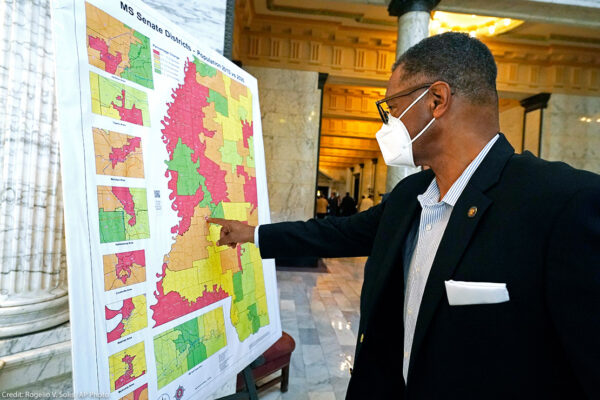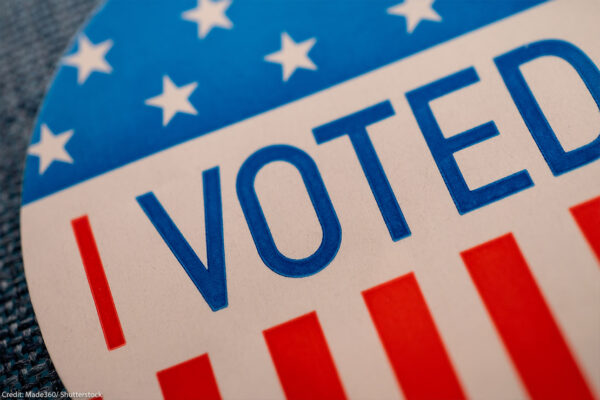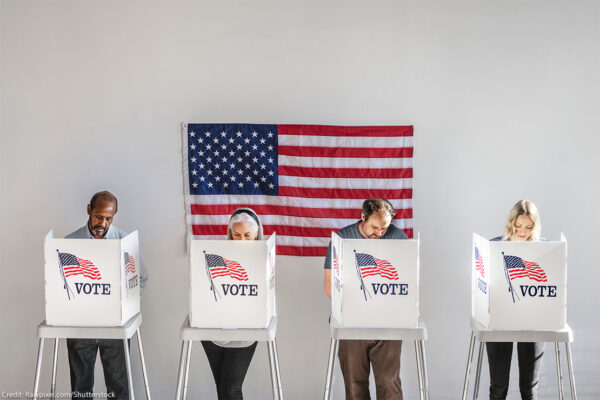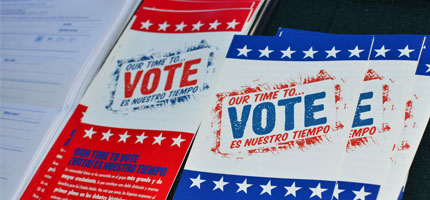Voting Rights
White v. Mississippi State Board of Elections
District lines used to elect Mississippi’s Supreme Court have gone unchanged for more than 35 years. We’re suing because the current lines crack the Mississippi Delta and dilute the voting strength of Black Mississippians in state Supreme Court elections, in violation of the Voting Rights Act.
Status: Ongoing
View Case
Learn About Voting Rights
Featured
U.S. Supreme Court
Nov 2025

Voting Rights
Racial Justice
Allen v. Milligan
Whether Alabama’s congressional districts violate Section 2 of the Voting Rights Act because they discriminate against Black voters. We succeeded in winning a new map for 2024 elections which, for the first time, has two congressional district that provide Black voters a fair opportunity to elect candidates of their choosing despite multiple attempts by Alabama to stop us at the Supreme Court. Despite this win, Alabama is still defending its discriminatory map, and a trial was held in February 2025 to determine the map for the rest of the decade.
In May 2025, a federal court ruled that Alabama's 2023 congressional map both violates Section 2 of the Voting Rights Act and was enacted by the Alabama Legislature with racially discriminatory intent.
Washington, D.C.
Oct 2025

Voting Rights
League of Women Voters Education Fund v. Trump
On March 25, 2025, in a sweeping and unprecedented Executive Order, President Trump attempted to usurp the power to regulate federal elections from Congress and the States. Among other things, the Executive Order directs the Election Assistance Commission—an agency that Congress specifically established to be bipartisan and independent—to require voters to show a passport or other citizenship documentation in order to register to vote in federal elections. If implemented, the Executive Order would threaten the ability of millions of eligible Americans to register and vote and upend the administration of federal elections.
On behalf of leading voter registration organizations and advocacy organizations, the ACLU and co-counsel filed a lawsuit to block the Executive Order as an unconstitutional power grab.
U.S. Supreme Court
Oct 2025

Voting Rights
State Board of Election Commissioners v. Mississippi State Conference of the NAACP
Mississippi has a growing Black population, which is already the largest Black population percentage of any state in the country. Yet. Black Mississippians continue to be significantly under-represented in the state legislature, as Mississippi’s latest districting maps fail to reflect the reality of the state’s changing demographics. During the 2022 redistricting process, the Mississippi legislature refused to create any new districts where Black voters have a chance to elect their preferred representative. The current district lines therefore dilute the voting power of Black Mississippians and continue to deprive them of political representation that is responsive to their needs and concerns, including severe disparities in education and healthcare.
U.S. Supreme Court
Oct 2025

Voting Rights
Louisiana v. Callais (Callais v. Landry)
Whether the congressional map Louisiana adopted to cure a Voting Rights Act violation in Robinson v. Ardoin is itself unlawful as a gerrymander.
Missouri
Sep 2025

Voting Rights
Wise v. Missouri
In unprecedented fashion, the State of Missouri has redrawn the district lines used for electing members of Congress for a second time this decade. These new district lines are gerrymandered and will harm political representation for all Missourians, particularly Black residents in Kansas City, who have been divided along racial lines.
Louisiana
Aug 2025

Voting Rights
Nairne v. Landry
Nairne v. Landry poses a challenge under Section 2 of the Voting Rights Act of 1965 to Louisiana’s House and Senate legislative maps on behalf of plaintiff Black voters and Black voters across the state.
All Cases
181 Voting Rights Cases

California
Jan 2026
Voting Rights
United States v. Weber
Representing the League of Women Voters of California, the ACLU Voting Rights Project, ACLU of Northern California, and ACLU of Southern California have filed a motion to intervene in a federal lawsuit over the federal government’s demand that California turn over its entire voter registration rolls, including with voters’ sensitive personal data such as drivers’ license numbers and partial social security numbers.
Explore case
California
Jan 2026

Voting Rights
United States v. Weber
Representing the League of Women Voters of California, the ACLU Voting Rights Project, ACLU of Northern California, and ACLU of Southern California have filed a motion to intervene in a federal lawsuit over the federal government’s demand that California turn over its entire voter registration rolls, including with voters’ sensitive personal data such as drivers’ license numbers and partial social security numbers.

Arizona
Jan 2026
Voting Rights
United States v. Fontes
The United States Department of Justice (“DOJ”) sued Arizona demanding the release of its full, unredacted voter file, which includes the highly sensitive and personal data of every voter in the state. This suit appears to be part of DOJ’s effort to build a national voter database without congressional authorization, improperly question the validity of state voter rolls, and intimidate eligible voters in Arizona and around the country.
Explore case
Arizona
Jan 2026

Voting Rights
United States v. Fontes
The United States Department of Justice (“DOJ”) sued Arizona demanding the release of its full, unredacted voter file, which includes the highly sensitive and personal data of every voter in the state. This suit appears to be part of DOJ’s effort to build a national voter database without congressional authorization, improperly question the validity of state voter rolls, and intimidate eligible voters in Arizona and around the country.

U.S. Supreme Court
Jan 2026
Voting Rights
Watson v. Republican National Committee (Amicus)
In 2020, in a nearly unanimous bipartisan vote, Mississippi joined eighteen other states in accepting mail ballots postmarked by Election Day that arrived after Election Day (in Mississippi’s case, up to five business days). This lawsuit by partisan actors seeks to disenfranchise these voters whose ballot is mailed by Election Day but—through no fault of their own—does not arrive until afterwards. In Mississippi, this harm will fall disproportionately on voters with disabilities, older voters, and other communities that rely upon absentee voting. Twisting the words and meaning of Congress, the RNC argues that three longstanding federal laws that set a uniform election day for federal races require that ballot may only be counted if they are received by election officials by Election Day. If accepted, this radical argument would not only disenfranchise thousands upon thousands of voters in Mississippi and eighteen other states, but also upend election administration in every state.
Explore case
U.S. Supreme Court
Jan 2026

Voting Rights
Watson v. Republican National Committee (Amicus)
In 2020, in a nearly unanimous bipartisan vote, Mississippi joined eighteen other states in accepting mail ballots postmarked by Election Day that arrived after Election Day (in Mississippi’s case, up to five business days). This lawsuit by partisan actors seeks to disenfranchise these voters whose ballot is mailed by Election Day but—through no fault of their own—does not arrive until afterwards. In Mississippi, this harm will fall disproportionately on voters with disabilities, older voters, and other communities that rely upon absentee voting. Twisting the words and meaning of Congress, the RNC argues that three longstanding federal laws that set a uniform election day for federal races require that ballot may only be counted if they are received by election officials by Election Day. If accepted, this radical argument would not only disenfranchise thousands upon thousands of voters in Mississippi and eighteen other states, but also upend election administration in every state.

Wisconsin
Jan 2026
Voting Rights
United States v. Wisconsin Elections Commission
The Department of Justice sued the Wisconsin Elections Commission and its members, demanding the state produce its full, unredacted voter file, which contains highly sensitive and personal data on every voter in the state. This suit appears to be part of the federal government's efforts to build a national voter database without congressional authorization and to improperly question the validity of state voter rolls.
Explore case
Wisconsin
Jan 2026

Voting Rights
United States v. Wisconsin Elections Commission
The Department of Justice sued the Wisconsin Elections Commission and its members, demanding the state produce its full, unredacted voter file, which contains highly sensitive and personal data on every voter in the state. This suit appears to be part of the federal government's efforts to build a national voter database without congressional authorization and to improperly question the validity of state voter rolls.

Florida
Jan 2026
Voting Rights
Hispanic Federation v. Byrd
Of all 50 states, Florida ranks 47th in percentage of its eligible citizens who are registered to vote. Yet, in May 2023, Florida Governor Ron DeSantis signed SB 7050, which bars any noncitizen — regardless of lawful residence status — from working or volunteering for third-party voter registration organizations (3PVROs) who register eligible Floridians to vote. In practice, the law imposes a $50,000 fine on a 3PVRO for each noncitizen who engages in voter-registration work on a 3PVRO’s behalf. This law would silence and put out of business countless community-based groups that rely on both citizens and noncitizens to help eligible voters in their communities participate in their democracy.
Explore case
Florida
Jan 2026

Voting Rights
Hispanic Federation v. Byrd
Of all 50 states, Florida ranks 47th in percentage of its eligible citizens who are registered to vote. Yet, in May 2023, Florida Governor Ron DeSantis signed SB 7050, which bars any noncitizen — regardless of lawful residence status — from working or volunteering for third-party voter registration organizations (3PVROs) who register eligible Floridians to vote. In practice, the law imposes a $50,000 fine on a 3PVRO for each noncitizen who engages in voter-registration work on a 3PVRO’s behalf. This law would silence and put out of business countless community-based groups that rely on both citizens and noncitizens to help eligible voters in their communities participate in their democracy.
